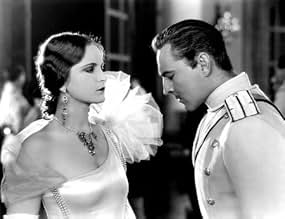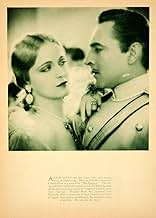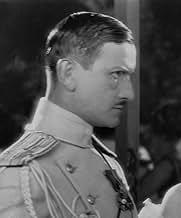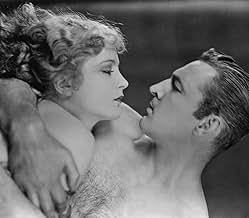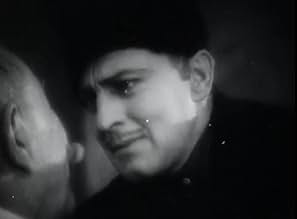In Czarist Russia, a peasant officer, resented by the aristocrats, falls in love with a princess.In Czarist Russia, a peasant officer, resented by the aristocrats, falls in love with a princess.In Czarist Russia, a peasant officer, resented by the aristocrats, falls in love with a princess.
- Won 1 Oscar
- 4 wins total
John Bleifer
- Soldier
- (uncredited)
Albert Conti
- Commission Board Member
- (uncredited)
Gregory Gaye
- Officer
- (uncredited)
Lena Malena
- Tamara's Friend
- (uncredited)
Michael Mark
- Soldier
- (uncredited)
Dick Sutherland
- Revolutionary Board Member
- (uncredited)
Wilhelm von Brincken
- Commission Board Member
- (uncredited)
Featured reviews
Enjoyable historical drama in which The Great Profile plays a Russian peasant who rises to the rank of Lieutenant immediately before the revolution only to find himself shunned by his fellow officers and the haughty princess he falls for. Fine chemistry between Barrymore and the beautiful German actress Camilla Horn helps paper over most of the film's meagre flaws.
A really magnificent movie with great performances. Don’t get caught in the political aspects of the movie, because I think that you will loose the beauty of the story. So aside from that the movie takes place in Russia the days of the Czars. A sergeant from the lower class tries to win a promotion to lieutenant which he rightfully deserves. But it’s hard, not to say impossible for someone from the lower class to get promoted and to be accepted by the aristocrats. The situation gets more complicated when the handsome Sergeant Ivan Markov falls in love with the Princess. But this are the last days of the Czarist Russia and the times are dangerous. An unbelievably captivating movie, the first time I saw it I couldn't get it out of my mind. I had to see it a second time too and a third… this movie leaves a mark! Even though there are only few months ago that I saw it, it is already one of my favorites. It has great performances from great actors like John Barrymore, Camilla Horn, Louis Wolheim and all the others and great directing work. I think you will fall in love with this movie if you see it. I have seen films with John Barrymore but this movie made me to truly appreciate him for a strange reason. It had great energy and emotion from the story and the performances of the actors.
'Tempest' gives John Barrymore plenty of chances to show his left profile. The plot -- utmost tosh, about a peasant cavalry officer obsessed with Princess Tamara during the Russian revolution -- doesn't stand up to analysis. Suffice it to say that this is one of those movies where a man keeps harassing a woman until she falls in love with him.
As Tamara, the haughty White Russian princess, Camilla Horn makes a magnificent entrance on horseback, riding sidesaddle in a form-fitting outfit with gauntlet gloves. Barrymore acquits himself well with a ridiculous script. There's one painful scene in which Lieutenant Markov (Barrymore) sups large quantities of booze to show how manly he is. Knowing what alcohol did to Barrymore's life and career, I cringe when I see him drinking on the screen.
Among the ridiculous elements is Boris de Fast as a gap-toothed Bolshevik whose ability to be conveniently present during all the plot twists (even surreptitiously entering a military stockade) borders on the supernatural. Ullrich Haupt, as Barrymore's villainous superior officer, is splendidly hissable in a role that seems tailored for Erich von Stroheim. Character actor Michael Mark plays one of the cavalry troopers: no dialogue, no business, but his distinctive facial structure calls attention to itself. Louis Wolheim supplies a bit too much comic relief as the bulbous and bull-like Bulba: I guess he must be Taurus Bulba. Wolheim plays a cavalry sergeant, but his immense bulk makes him implausible in the role; Wolheim is built more like an infantryman.
By far, the greatest appeal of this movie is Charles Rosher's dazzling camera-work, supplemented by the usual brilliant production design of William Cameron Menzies. The opening scene is a travelling shot of a military garrison: the camera is clearly panning across models, but they're as exquisitely detailed as one of those miniature villages that used to be so popular in Britain. Eventually the camera turns round a corner to show men walking past full-scale buildings ... but the cut is so well done, it's nearly seamless. Elsewhere, there's a splendid subjective shot through the bottom of an upturned glass ... and a fine example of double-exposure as the delirious Barrymore, rotting in the stockade, envisions his comrades in battle.
I was also impressed with the consistent use of dissolves whenever printed words, handwriting or inscriptions were shown on screen. As all the characters are Russian, we first see signs and captions written in Cyrillic, followed by a dissolve into English translations. (Compare this with 'The Last Command', made at a different studio this same year, in which a Russian telegram is shown on screen in English.) Just a couple of times in 'Tempest' the dissolve device is not used, and there's one bizarre shot in which a handwritten note reading 'Do not disturb' in English is posted on the same door as a sign reading 'Commissar' in Cyrillic. Still, I'm vastly impressed that the art department went to so much trouble.
Although the script is rubbish -- and I'm dismayed that the Bolsheviks are depicted favourably -- Barrymore's role has an impressive amount of moral ambiguity. Lieutenant Markov is basically moral and ethical, but he becomes obsessed with Princess Tamara ... and his behaviour degenerates accordingly. The script (and Barrymore) could have taken an easier route by contriving to make all of Markov's reversals a matter of circumstances rather than down to Markov's personal flaws.
Despite a howlingly implausible script, the visuals and the acting are so good in this film that I'll rate it 7 in 10.
As Tamara, the haughty White Russian princess, Camilla Horn makes a magnificent entrance on horseback, riding sidesaddle in a form-fitting outfit with gauntlet gloves. Barrymore acquits himself well with a ridiculous script. There's one painful scene in which Lieutenant Markov (Barrymore) sups large quantities of booze to show how manly he is. Knowing what alcohol did to Barrymore's life and career, I cringe when I see him drinking on the screen.
Among the ridiculous elements is Boris de Fast as a gap-toothed Bolshevik whose ability to be conveniently present during all the plot twists (even surreptitiously entering a military stockade) borders on the supernatural. Ullrich Haupt, as Barrymore's villainous superior officer, is splendidly hissable in a role that seems tailored for Erich von Stroheim. Character actor Michael Mark plays one of the cavalry troopers: no dialogue, no business, but his distinctive facial structure calls attention to itself. Louis Wolheim supplies a bit too much comic relief as the bulbous and bull-like Bulba: I guess he must be Taurus Bulba. Wolheim plays a cavalry sergeant, but his immense bulk makes him implausible in the role; Wolheim is built more like an infantryman.
By far, the greatest appeal of this movie is Charles Rosher's dazzling camera-work, supplemented by the usual brilliant production design of William Cameron Menzies. The opening scene is a travelling shot of a military garrison: the camera is clearly panning across models, but they're as exquisitely detailed as one of those miniature villages that used to be so popular in Britain. Eventually the camera turns round a corner to show men walking past full-scale buildings ... but the cut is so well done, it's nearly seamless. Elsewhere, there's a splendid subjective shot through the bottom of an upturned glass ... and a fine example of double-exposure as the delirious Barrymore, rotting in the stockade, envisions his comrades in battle.
I was also impressed with the consistent use of dissolves whenever printed words, handwriting or inscriptions were shown on screen. As all the characters are Russian, we first see signs and captions written in Cyrillic, followed by a dissolve into English translations. (Compare this with 'The Last Command', made at a different studio this same year, in which a Russian telegram is shown on screen in English.) Just a couple of times in 'Tempest' the dissolve device is not used, and there's one bizarre shot in which a handwritten note reading 'Do not disturb' in English is posted on the same door as a sign reading 'Commissar' in Cyrillic. Still, I'm vastly impressed that the art department went to so much trouble.
Although the script is rubbish -- and I'm dismayed that the Bolsheviks are depicted favourably -- Barrymore's role has an impressive amount of moral ambiguity. Lieutenant Markov is basically moral and ethical, but he becomes obsessed with Princess Tamara ... and his behaviour degenerates accordingly. The script (and Barrymore) could have taken an easier route by contriving to make all of Markov's reversals a matter of circumstances rather than down to Markov's personal flaws.
Despite a howlingly implausible script, the visuals and the acting are so good in this film that I'll rate it 7 in 10.
"Tempest" will be of interest to anyone who wants an example of John Barrymore's considerable screen presence. He's quite good as a star cadet culled from the ranks of the Russian peasantry whose fortunes take a turn for the worse when he falls foul of his boss's daughter. The story is pure melodrama, with lots of arched eyebrows and swooning romantic embraces, but Barrymore pulls it off with flair, and there's something ahead of its time about his acting. It's natural in a way that a lot of acting in the silent era (and even for a while after) wasn't.
The film overall is a bit saggy, and suffers from lugubrious pacing and static shots that linger past the point when they should. William Cameron Menzies won the first Academy Award given for art direction for his work on this film and another from the same award year, "The Dove," while Charles Rosher, who won the first cinematography Oscar for "Sunrise," provides the camera work. To be sure the film looks good, but it would have benefited from crisper editing.
A not overly memorable film from the last days of the silents, but enjoyable for what it is.
Grade: B
The film overall is a bit saggy, and suffers from lugubrious pacing and static shots that linger past the point when they should. William Cameron Menzies won the first Academy Award given for art direction for his work on this film and another from the same award year, "The Dove," while Charles Rosher, who won the first cinematography Oscar for "Sunrise," provides the camera work. To be sure the film looks good, but it would have benefited from crisper editing.
A not overly memorable film from the last days of the silents, but enjoyable for what it is.
Grade: B
Drama
Format: Standard 4:3, B&W, silent
Director: Sam Taylor
Starring: John Barrymore and Camilla Horn
Drew Barrymore's grandfather John is the main highlight of this film. His portrayal of Ivan Markov during 1914 Czarist Russia is ripe with excellent acting and great emotion, which flows forth from his face. Some supporting actors in this film were not too great, except for George Fawcett, who plays the commanding General of Ivan's garrison. The main problem with the characters and acting is too much fluff and too much over acting, but Barrymore is amazing.
In one scene, he is being demoted and sent to jail and the anguish coming off of his face, as they tear his medals off of his vest, is something to be seen. In another scene we see Ivan enter into madness and just the look on his face is something I won't forget for a while. While he is in prison, he begins to see images on the prison wall, which is done quite well with very good matte work for 1928.
Fawcett's character is very likeable and you enjoy seeing him every time he comes into a scene. His kindness he shows towards Ivan, from behind a rough exterior, is very believable and heart-warming. I also enjoyed Louis Wolheim as Bulba, but 3/4 of the way through the film his character changes and I didn't like that.
The story is quite good, and I worry that some of it may have been lost due to missing splices that looked like chunks of lost continuity. Right in the very beginning and especially at the very end. An excellent shot of the town opens up to a really nice story that falls apart slightly by the end, but definitely a film worth seeing. It is not great, but is very good.
8.2 (B MyGrade) = 8 IMDB.
Drew Barrymore's grandfather John is the main highlight of this film. His portrayal of Ivan Markov during 1914 Czarist Russia is ripe with excellent acting and great emotion, which flows forth from his face. Some supporting actors in this film were not too great, except for George Fawcett, who plays the commanding General of Ivan's garrison. The main problem with the characters and acting is too much fluff and too much over acting, but Barrymore is amazing.
In one scene, he is being demoted and sent to jail and the anguish coming off of his face, as they tear his medals off of his vest, is something to be seen. In another scene we see Ivan enter into madness and just the look on his face is something I won't forget for a while. While he is in prison, he begins to see images on the prison wall, which is done quite well with very good matte work for 1928.
Fawcett's character is very likeable and you enjoy seeing him every time he comes into a scene. His kindness he shows towards Ivan, from behind a rough exterior, is very believable and heart-warming. I also enjoyed Louis Wolheim as Bulba, but 3/4 of the way through the film his character changes and I didn't like that.
The story is quite good, and I worry that some of it may have been lost due to missing splices that looked like chunks of lost continuity. Right in the very beginning and especially at the very end. An excellent shot of the town opens up to a really nice story that falls apart slightly by the end, but definitely a film worth seeing. It is not great, but is very good.
8.2 (B MyGrade) = 8 IMDB.
Did you know
- TriviaCarole Lombard was considered for the role of Princess Tamara.
Details
Contribute to this page
Suggest an edit or add missing content



